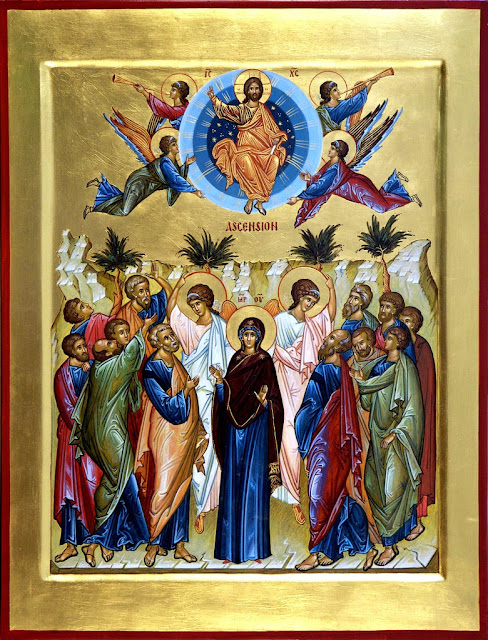The Hallowing of Heaven
The following is
reprinted without permission from the St.
James Daily Devotional Guide, Spring 2015. You may subscribe to this excellent
devotional resource here,
and read reflections from earlier editions free online here. I reproduce this
single entry on this blog due to its profundity and obscurity. Never in a
decade and a half of professional religious life have I heard of “The Hallowing
of Heaven.” Rather blew my mind.
Ascension Thursday
St. James Daily Devotional Guide, Spring 2015
Jesus rose from the dead, not in order to return to the
earth, but in order to enter “into heaven itself, now to appear in the presence
of God for us” (Hebrew 9:24). His priesthood is heavenly; indeed, “if he were
on earth, he would not be a priest” (8:4). His priestly service, commenced on
Calvary, was perfected when, “not with the blood of goats and calves but with
his own blood, he entered the Most Holy Place once for all, having obtained
eternal redemption” (9:12).
The Lord’s Ascension, in short, was essential to the work of the Atonement. According to a theme developed chiefly in the Epistle to the Hebrews, God united us to himself—made us at-one with himself—not only by the Son’s assumption of our humanity in the Incarnation, but also by this Son’s bearing our humanity home to the Father. In Christ’s Ascension, God eradicates every vestige of our alienation from him.
The Lord’s Ascension, in short, was essential to the work of the Atonement. According to a theme developed chiefly in the Epistle to the Hebrews, God united us to himself—made us at-one with himself—not only by the Son’s assumption of our humanity in the Incarnation, but also by this Son’s bearing our humanity home to the Father. In Christ’s Ascension, God eradicates every vestige of our alienation from him.
This theme elicits four considerations:
First, the Lord’s ascent on high is the counterpart to his
descent into hell. Just as, in dying, “he went and preached to the spirits in
prison” (1 Peter 3:19), so, in his ascent into heaven, “he became the cause (aitios) of eternal salvation to all who
obey him” (Hebrews 5:9). He met angelic spirits in both places: in hell the
fallen spirits, and in heaven “an innumerable company of angels” (12:22). The
structure of Cosmology itself demanded this; an ontological postulate of his
Lordship required “that at the name of Jesus every knee should bow, of those in
heaven, and of those on earth, and of those under the earth” (Philippians
2:10).
Second, Jesus entered into heaven in order to cleanse and
consecrate “the greater and more perfect tabernacle not made with hands”
(Hebrews 9:11), “the true tabernacle the Lord pitched and not man” (8:2). This
hallowing of heaven, which corresponded to the harrowing of hell, was an
essential part of the Atonement. Just as the earthly sanctuary was cleansed and
consecrated with the blood of sacrificial offerings, so it was necessary that
the heavenly sanctuary should be purified “with better sacrifices than these”
(9:23).
It is a foundational teaching of Holy Scripture that man has
no communion with God, even in heaven, except in and through the blood of the
Lamb. His blood is the instrument of the expiation and purification of all
things, including “heaven itself” (9:24). For even “the heavens are not pure in
his sight” (Job 15:15).
Because Christ’s cleansing of the heavenly sanctuary—clearly
affirmed in the Epistle to the Hebrews—is not, I think, a theme much developed
in later theology, a word of explanation may be in order. We may start by
reflecting that sin—alienation from God—did not begin on earth but in heaven.
Sin was found in heaven before it was found on earth. Indeed, earth was
contaminated from heaven, when the rebellious demons instructed and encouraged
men to rebel against God. Prior to Christ’s cleansing of it, the heavenly
tabernacle was still infected with the vestiges of that demonic rebellion.
A particularly distressing aspect of that contamination was
the ability of Satan to stand before the Almighty as man’s Accuser. But no
more, because “now salvation, and strength, and the kingdom of our God, and the
power of his Christ have come, because the Accuser of our brethren, who indicted
them day and night before our God, has been cast down” (Revelation 12:10).
Third, by the blood-purification of the heavenly tabernacle,
the Accuser has been replaced by the Advocate (cf. Irenaeus, Against the Heresies 3.17.3). In heaven he
ever lives to intercede for us (Hebrews 7:25). This theological thesis is not
limited to the Epistle to the Hebrews. John, for instance, writes, “we have an
Advocate with the Father, Jesus Christ the righteous. And he himself is the
expiation of our sins, and not for ours only but also for the whole world” (1
John 2:1-2). And Paul, for his part, declares that Christ’s heavenly advocacy
on our behalf is a component of Redemption, for he “died, and furthermore is
also risen, who is even at the right hand of God, who also makes intercession
for us” (Romans 8:34).
Fourth, by his ascent into heaven, Christ makes heavenly
blessings available to us on earth. In particular, Christ’s Ascension provides
an “entrance” for us. We, too, have access to the Throne (Hebrews 4:16;
12:22-24). Even now, in and through his blood, there is “a better hope, by
which we draw night to God” (Hebrews 7:19).

Comments
Post a Comment